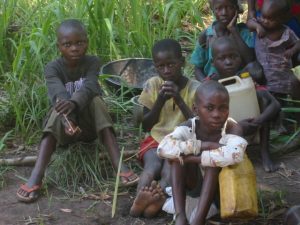Stories of horrific violence in the Democratic Republic of the Congo (DRC) are all too common; however, there are even more attacks—especially on women and children—that we don’t hear about. Villages, especially in the eastern provinces, are often raided by armed groups. Women and girls are raped and need immediate medical assistance; but health facilities are scarce. Boys and girls are abducted to be used as soldiers or porters. Girls are taken to be cooks and wives. These villages are isolated and have almost no means to defend themselves. Despite a 2008 peace agreement, the DRC’s eastern provinces continue to be plagued by violent conflict. And civilians face egregious violations on a daily basis.
One of the biggest challenges the humanitarian assistance community faces in monitoring, reporting and responding to human rights violations in a country like the DRC is access: access to information about the violations, and access to the victims who need urgent assistance. In a country the size of Western Europe, with a large swathe of jungle and poor infrastructure, attacks can go unreported for weeks and months. And victims are often unable to get assistance because they don’t know that help is available, where to get it or how to get there. But that is beginning to change.
While health and support services are extremely limited, cell phone service is not. Over the last five years, Watchlist and its local partner organization in South Kivu have been using cellular technology to link those who have experienced violence to those who can help them. Cell phone communication is booming all over Africa, and the DRC is no exception: cells phones are becoming ubiquitous. Cell towers are being built rapidly, expanding reception to even the most remote areas. Outlying villages in South Kivu don’t have electricity, but these communities are using solar energy-operated cell phones and chargers—which is enabling hundreds of people to get help.
Our local partner has given out these cell phones (and credit) for use in an emergency and mapped out service providers in the area. Each call sets in motion a rapid response, as our partner organization assesses what type of help is needed, identifies the nearest resource and brings the aid provider and the victim together. Since the end of 2006, more than 400 victims of human rights violations living in remote areas of South Kivu have received assistance through this initiative. Most of them are children, who don’t have anywhere else to turn.
In addition to being a rapid response tool, cell phones are used to systemically report and track conflict-related violations against children—Watchlist’s main focus. These violations include killing and maiming; rape and other forms of sexual violence; abduction; denial of humanitarian assistance; attacks on schools and the recruitment and use of children as combatants. Cases collected through this initiative are verified and coded to protect the security and privacy of victims. This documentation helps us advocate on the children’s behalf at the highest level, both in the DRC and internationally, specifically at the United Nations and its Security Council.
These reporting efforts, coupled with targeted high-level advocacy by Watchlist and our partners, have led to positive, concrete results. Children’s rights violations are now grounds for sanctions against individuals involved in the conflict in the DRC. In a landmark case that is now entering the final stages at the International Criminal Court, Thomas Lubanga, a former commander of a major armed group in the DRC, was charged with a war crime for his use of child soldiers. Moreover, hundreds of children have been released or escaped from the ranks of armed groups in the DRC. The UN and local organizations have helped them return to their families safely and get the health care, psychosocial assistance and educational opportunities they need.
With the simple use of cell phones, some of world’s most vulnerable children can finally be heard.




